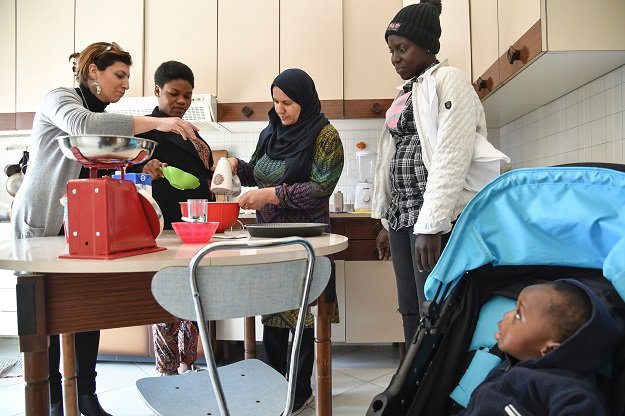Sant’Alessio (Italy) – On the foothills of the Aspromonte Mountain in southern Italy, the laughter of a small group of refugees breaks the silence of a once-dying village.
The small village has been welcoming families and vulnerable migrants for three years in a project which not only provides humanitarian assistance, but also brings invaluable economic and social benefits.
Over the years, the village population has dwindled to only 330 inhabitants, many of them elderly. The steep cobbled streets are deserted and most windows are shuttered after residents gradually left for better work opportunities in Turin, Milan or as far away as Australia. In an attempt to revive the town, however, the municipal the council has been renting eight of these empty flats to house up to 35 migrants at a time as part of the national Protection System for Asylum Seekers and Refugees network (SPRAR).
The council has done all it can to help the newcomers, such as providing Italian lessons, legal, medical and psychological assistance, vocational training and social activities, such as gardening, cooking and dance classes.
The village is currently home to an Iraqi Kurdish family, a Gambian family, and young people from Ghana, Nigeria, Mali and Senegal.
There is a special project for the most vulnerable categories, including people suffering from HIV, diabetes, victims of prostitution networks, a deaf-mute couple, and a young woman who lost her toddler and husband in Libya.
Stefano Calabro, a 43-year-old policeman who has been mayor of Sant’Alessio since 2009, said: “Our mission is humanitarian, that is the most important thing … but there is a significant economic benefit too.”
The state allocates up to US$47 dollars a day for each migrant, most of which goes to the organizers to cover costs.
The project has created full and part-time jobs in Sant’Alessio for 16 people, seven of them are locals involved in social work and teaching Italian. It has also prevented the closure of the village’s basic services, including a small supermarket, a doctor’s clinic and pharmacy.
With funds to spend on services, the municipal council has been able to open a small gym that is open to all residents and reserve a sports field overlooking the valley, where migrants regularly play against the team from a nearby drug rehabilitation center.
After six months to a year here, some of the refugees found work opportunities in the region, while others headed elsewhere.
Ghanaian Salifu, 23, decided to stay and has been living off odd jobs, like helping with manual work in the fields. Sant’Alessio may not be the perfect place to start a career, but Salifu happily says that he’s not going anywhere.
After months spent in Sicily’s notorious Mineo camp, small things like booking a quick doctor appointment is considered a luxury.
Antonio Sacca, 89, who spent 54 years working in a Turin factory before returning home, sits in his front garden to enjoy the sunshine. He says his new neighbors behave well, they have independent lives, but often do not offer help.
This project’s success motivated Coopisa, the association behind it, is opening others in four villages nearby.
